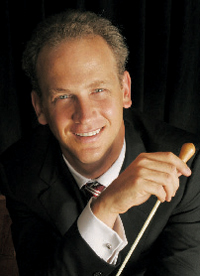Carlos Miguel Prieto has been instrumental in the LPO’s comeback
 After Hurricane Katrina, the Louisiana Philharmonic Orchestra was displaced not only from the Orpheum Theater but from the city itself. The classical music community reached out to the LPO, allowing them to perform nationwide, sometimes alongside other top orchestras.
After Hurricane Katrina, the Louisiana Philharmonic Orchestra was displaced not only from the Orpheum Theater but from the city itself. The classical music community reached out to the LPO, allowing them to perform nationwide, sometimes alongside other top orchestras.
After a brief visit in December 2005 and a shortened season in spring 2006, the LPO returned to New Orleans for the 2006–07 season, performing at various local venues for appreciative audiences. That it has managed so well is a tribute to the cohesiveness of the orchestra, which is musician-owned and collaboratively managed, and to enthusiastic leadership, including that of Carlos Miguel Prieto, who became music director just one week before Katrina. I interviewed Prieto recently by phone. His vitality and enthusiasm for music and for New Orleans were evident throughout.
What is your background?
I was born in Mexico City to a family of amateur musicians, street players. So I had contact with music very early in my life. I started playing the violin when I was five, and grew up with music as a hobby.
I went to college in the United States, to Princeton University, where I [studied] electrical engineering while playing in the orchestra. I was the concert master of the orchestra there. I never thought that I would become a professional musician. I came back to music later, close to my 30th birthday.
Did you work in engineering before becoming a conductor?
Not as an engineer but in business, without real satisfaction. I always continued to do music [on the side]. I had a vocational crisis, until I found my way. I made a difficult decision to change course, but it became a good one later.
How did you get your first conducting job?
I had done concerts as a guest conductor in Mexico, with quite a lot of success. After a while, musicians started to know who I was. Then, there was an opening in the Mexico City Philharmonic for associate conductor. I was there between 1997 and 2000. It was a very formative and special period of my life.
When did you come to the Louisiana Philharmonic?
In 2003, I conducted Shostakovich’s Fifth Symphony here in an unforgettable concert. I liked the energy and the character of the orchestra. They invited me back, and I came here [on several occasions]. They offered me the job of music director one week before Katrina. When Katrina happened, I had even more of a feeling of commitment [to the LPO] and of the importance of having an orchestra in the community. Given the size of New Orleans and everything that has happened, I am very proud of the amount of support and the level of commitment the orchestra has received.
You’re doing a Gershwin program featuring Porgy and Bess [May 9 and 10], and Mahler’s Resurrection closes the season [May 15 and 16]. How did you choose these pieces?
These two pieces are so important that there is always a good excuse to play them. They also fit in the overall scheme of our season. Porgy and Bess is a part of American culture, and
it’s one of the few pieces of classical music that is at the border between classical and popular culture. People know the tunes, like “Summertime.” Porgy and Bess is a great, powerful piece, very beautiful and very entertaining.
The Mahler concert [fits with this] season, where we’ve done pieces that are called “Creation,” “Requiem” and “Resurrection.” Mahler’s Second Symphony, “Resurrection,” is one of the most uplifting. We’ve been wanting to do it for a while, because we’ve been meaning to tell New Orleans, “This is the resurrection of the arts in New Orleans.” So, it is interesting that we are finishing out the season with a piece that addresses such an essential and beautiful theme.
What is coming up next year?
We’ll be doing all of Beethoven’s symphonies in ascending order. The other topic for the season is the elements—water, fire, wind and earth. An extra-musical topic that fits with the music very well.
Any concluding thoughts?
Sometimes people view classical music as inaccessible. In reality, it’s just the opposite. It’s there for people’s enjoyment and for the learning. We’ve had two-and-a-half successful seasons, and I see a very nice progression in the audience and the orchestra. I hope the opportunity to play the Beethoven symphonies will bring us even closer to the audience and closer to the heart of New Orleans.
Gershwin Revue will be performed at First Baptist Church Covington on May 9, 2008, and at First Baptist New Orleans on May 10, 2008. “Resurrection” will be performed on May 15 and 16 at First Baptist New Orleans. For more information and for tickets for these and the season’s remaining concerts, visit the LPO Web site at www.lpomusic.com
